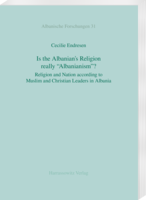|
|
more titles of the subject:
Download:
Please note: With adding digital Products to your cart
the payment will be handled via PayPal. The download will be provided after the payment is confirmed. For over a century, Albanians have been urged to view religious differences as unimportant. But are they? By conducting an unique set of interviews with representatives of the country’s high-ranking clerics, Cecilie Endresen tries to answer this question. The clerics speak of an interplay between nation and religion in the their own symbolic universes and expound on such themes as salvation, religious tolerance, historical developments, theological differences, and politics. While embracing national unity and religious tolerance as an overriding ethos, they nonetheless manifest a certain religious rivalry and a sense of unjust treatment. As such, they appear to contradict their own claims; at the same time, they are proud to be Albanian and intent on upholding national unity. Their perception of what it means to be “Albanian” is invariably related to the question of religious differences and inter-religious relations. Endresen’s study investigates religion in multi-religious, post-atheist Albania by highlighting the fluidity and the extreme complexity of relations between nation and religion in Albania – compounded by the effects of global politics, local traditions, religious doctrine, personal experience, regional history, national myths, Communist propaganda, and conspiracy theories.
|
|||||||||||||||||||||||||||||||||||||||||






